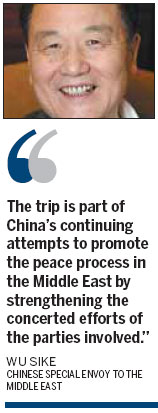
|
Chinese special envoy Wu Sike said he has never grown tired of hisshuttle diplomacy in the Middle East, serving gladly because he ishappy that China is making a contribution to the Israeli-Palestinianissue. After preparation for overlapping visits to China by top Israeli andPalestinian leaders this month, the 67-year-old ambassador began onTuesday a 10-day trip to Jordan, Egypt and the Arab Leagueheadquarters in Cairo. "The trip is part of China's continuing attempts to promote the peaceprocess in the Middle East by strengthening the concerted efforts ofthe parties involved," Wu said before leaving. "We hope to renewideas and further coordinate positions on this issue with these sides,which all play important roles during the process." Last year, Jordan hosted the first meeting between Israeli andPalestinian negotiators since the talks broke down in 2010 over theissue of Jewish settlements in the West Bank. There was no indication of meeting of leaders until speculation aroseabout whether Palestinian President Mahmoud Abbas and IsraeliPrime Minister Benjamin Netanyahu would meet during their visits to China in May. The long-awaited meeting did not happen. But Wu said the unusualdiplomatic situation "created a positive atmosphere for restarting adialogue between the two sides" after the positive sign that Abbas and Netanyahu had notrefused to visit China almost simultaneously. Beijing, which maintains good relations with both sides and respects their interests, served asan indirect but efficient channel for their communication at the highest level, he added. In a meeting with Abbas, President Xi Jinping presented a four-point proposal for settling theIsraeli-Palestinian conflict. It was seen as China's attempt to promote peace in the Middle Eastby solidifying international consensus. China urged that Israeli-Palestinian peace remains the core issue in the Middle East andsignificantly influences the region. However, the problem was gradually marginalized over the past several years due to massivepolitical turmoil in the Arab world and with Washington, the biggest external force in the issue,which shifts its strategic focus to the Asia-Pacific region. Wu warned that leaving the issue deadlocked was dangerous, saying that Arab's sense ofbeing marginalized has increased the risk of instability. "The issue is so complicated that any breakthrough is hard to achieve overnight, and all partiesneed to take persistent and patient steps, even small ones, toward peace," said Wu. "It is difficult to restart a car once its engine stops, so the international community cannot ceaseits efforts," he added. The United States will retain its vital say in the Middle East peace process, but the internationalcommunity will benefit more if countries, such as China, add balance to the sometimes-biasedUS stance, Wu said. "This is not a zero-sum game in which one replaces another one, and China, as a responsiblemajor power, would not shun the complexity but play an active role with the other parties in theMiddle East peace process," he said. |
在過去的幾年間,中國中東問題特使吳思科頻繁往返于中國和中東之間進行穿梭外交,但他從不因此覺得勞累,反而因為中國能為長期棘手的巴以問題出力而感到“很開心”。 在成功為本月初巴以最高領導人來華訪問做好準備工作后,這位67歲的大使又即將于本月28日至6月6日訪問約旦、埃及和阿盟總部。 “此次訪問是中國推動中東和平進程持續(xù)努力的一個部分,目的是使各方面力量形成合力,”吳思科特使在行前告訴《中國日報》。 吳思科特使表示,該四方都對巴以問題的解決有重要的作用,而他在此行中將與這四方交換意見,使之更了解中國的主張并更好地協(xié)調(diào)各方立場。 去年,約旦主持了巴以代表會面,那次會面是2010年巴以和談由于以色列修建猶太人定居點問題中斷后,雙方第一次公開進行的直接會面,但是巴以并沒能就重啟直接會談達成一致。反而是在本月初,巴勒斯坦總統(tǒng)阿巴斯和以色列總理內(nèi)塔尼亞胡幾乎同時訪華時,外界對于兩人是否能夠在華會面的猜測不絕于耳。 雖然期待已久的阿巴斯-內(nèi)塔尼亞胡會面沒能實現(xiàn),但是吳思科特使認為,兩人沒有排斥幾乎同時訪華本身已經(jīng)是一個積極信號,北京方面的創(chuàng)新安排為重啟和談創(chuàng)造了友好氣氛。 吳思科特使補充說,中國與兩國都保持著良好關系,并對雙方的利益予以充分尊重。此次巴以兩國領導人在華訪問期間,中方還在最高層間進行了非直接但有效的傳話溝通。 國家主席習近平6日在會見阿巴斯會談時,就推動解決巴勒斯坦問題提出了四點主張。此份中國在巴以問題上第一次提出的倡議受到廣泛歡迎,并被認為是中方通過凝聚國際社會共識,尋求在中東和平進程中發(fā)揮更大的推動作用。 其中,中方始終認為巴勒斯坦問題是中東問題的核心,并對地區(qū)局勢有著重要的影響。但是,該問題在過去幾年間由于阿拉伯世界的政治動蕩,以及美國戰(zhàn)略重心東移等原因而逐漸被邊緣化。 吳思科特使警告巴勒斯坦問題停滯不前或被邊緣化的危險,并表示,阿拉伯人民由于巴以問題拖而不決而產(chǎn)生的怨恨和屈辱感已增加了更多的不穩(wěn)定因素。 “巴以問題十分復雜,不能在一朝一夕就尋求大的突破,需要各方一步一步向前努力,”他說。 “就像汽車一旦停止,重新發(fā)動就難了,國際社會不能停止或放松為中東和平進程做出努力,”他強調(diào)。 吳思科特使還表示,美國在此進程中仍將起到主導作用,但是其立場有時難免偏頗,因此,若國際社會各方都積極參與、發(fā)揮作用,將更有益于問題解決。 “這并不是零和游戲或誰將取代誰的問題。中國作為一個負責任的大國不會回避巴以問題的復雜性,而將會與其他各方一起為推進中東和平進程發(fā)揮積極作用,”他說。 相關閱讀 (中國日報記者趙盛楠編譯) |
